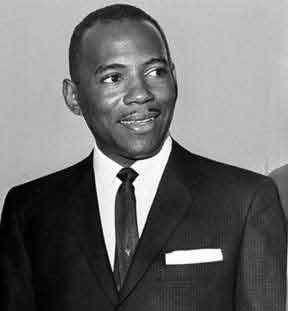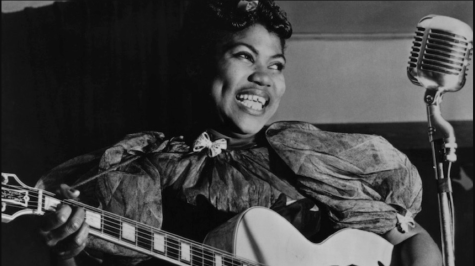If you think getting into college is hard, try to be James Meredith

James Meredith in 1962
College is no small task for students now; you have to have the perfect GPA, SAT and ACT scores, extracurriculars, and doing pretty much everything you can to get a college to accept you. But imagine trying to do this, but being denied because you were a different race. James Meredith was an African-American student who was brave enough to challenge the status quo of his day and age.
James Howard Meredith was born in June of 1933 in Kosciusko, Mississippi. Like any other Jim Crow Law state, James Meredith attended segregated, public schools. After high school he enlisted in the United States Air Force, from 1951-1960. After leaving the Air Force, Meredith attended Jackson State University. However, he strived to attend one of Mississippi’s top schools (which was also an all-white school) University of Mississippi. Inspired by President John F. Kennedy’s inauguration speech, James Meredith decided to go against the status quo and apply to University of Mississippi with the aid of Medgar Evers, head of the Mississippi state chapter of the NAACP. Despite going to court and winning appeals all the way up to the Supreme Court who ruled in Meredith’s favor and told the Mississippi governor that the university was denying Meredith because of his race, Ross Burnett (the governor) said “no school will be integrated in Mississippi while I am your governor.” A law that said “anyone who has been convicted or any felony offense or not pardoned” was created by the state legislature and purposefully directed at James Meredith–he was convicted of “false voter registration” in Jackson County earlier in his life. However, on September 28, Governor Bennett was arrested for civil contempt and fined $10,000 for each day he continued to deny Meredith. Between September 27 and October 1, US Attorney General Robert F. Kennedy continually discussed the situation with the stubborn governor. Many phone calls later, Governor Barnett allowed Meredith to attend the University of Mississippi (Kennedy had made a deal that would allow the governor to save face.) On his first day on September 29, 500 U.S. Marshals accompanied Meredith during his arrival and registration. However, after withdrawing the State police, a riot of whites who opposed the decision broke out on campus. When the clash finally ended, two men were dead and the mob had destroyed cars, injured federal marshals with small items like rocks and bricks. Despite this debacle, James Meredith became the first African-American to be enrolled at the University of Mississippi on October 1, 1962. Even with the constant harassment and persecution on campus, James Meredith graduated on August 18, 1963 with a bachelor’s degree in political science.
After graduation, Meredith continued studying political science at the University of Ibadan, a school in Nigeria. He returned home in 1965. In 1966 Meredith organized and led the March Against Fear. This march would be a 220 mile march that went from Memphis to Jackson. James Meredith asked for only black men to join him in order to give African-Americans the courage to move past the fear. Despite having police protection, Meredith was shot on the second day of the march and could not finish the march. However, by the time the march arrived in Jackson, there were 15,000 people (the largest civil rights march in Mississippi’s history) and over 4,000 African-American Mississippians successfully registered to vote that day.
After this march, James Meredith a law degree from Columbia University and continued his career in politics. During his time at Columbia, Meredith attempted to run as a Republican against Adam Clayton Powell, Jr., who was a seasoned Democrat, in an election for a Congressional seat in Harlem. Meredith then withdrew from the race due to the Republican supporting Powell. After finish in New York, Meredith returned to Mississippi where he ran for Senate in 1972. James Meredith’s opposer, James Eastland, had been serving for 29 years which made Mississippi operate as a one party state. However, Meredith lost due to African-Americans being disenfranchised by making it extremely difficult for them to register to vote. Because most of them were Republican, Meredith lost the race. However, it did not stop Meredith: from 1989 – 1991, he was an adviser on the staff of Senator Jesse Helms, who was a segregationist. Although he was received criticism from civil rights community, it was only Helm’s office that responded to Meredith’s offer (he had applied to every Senator’s and Congressman’s office).
Through his many uphill battles, James Meredith was able to proceed in his education and political career. He is still alive today and represents the strength persistence of the Civil Rights Movement. This man is a strong University of Mississippi graduate.







